|
De Duitse schrijver Hermann Kant werd op 14 juni 1926 in Hamburg geboren. Zie ook mijn blog van 14 juni 2007 en ook mijn blog van 14 juni 2008 en ook mijn blog van 14 juni 2009 en ook mijn blog van 14 juni 2010.
Uit: Die Aula
Sie kamen in einen Raum, der wie eine Schulklasse aussah und Robert setzte sich in die letzte Reihe. Er gab ihnen ihre neugierigen Blicke wütend zurück, und er ärgerte sich, dass er nicht wie sie eine Mappe mitgebracht hatte. Als ein alter Mann den Raum betrat, klopften die anderen mit den Knöcheln auf die Bänke und trampelten mit den Füßen. Robert wusste, dass Studenten so grüßten. Früher. Und er wunderte sich, dass es dies immer noch gab. Und außerdem waren sie vorerst doch noch Arbeiter und Bauern, die zu einer Eignungsprüfung gekommen waren, und keine Studenten.
(...)
Selten sah man einen, sagte der alte Mann und hielt Robert, der zur Tür wollte, am Ärmel fest, den es so zu einer Prüfung zog wie diesen hier. Aber verweilen Sie doch noch einen Augenblick, lieber Arbeiter, oder sind Sie ein lieber Bauer? Sie sollten sich so fremd nicht fühlen unter uns; der Hirtenstand ist uns doch sehr nahe, und der Hasenjäger in der ersten Reihe da ist eines Häuslers Sohn, nicht wahr, Hasenjäger? Ein untersetzter Bursche stand auf und sagte: Jawohl, Herr Professor, aus Spandowerhagen! Sehen Sie, sagte der Professor, von der Scholle einer wie Sie. Und unser aller Herr, dessen Lehre zu verbreiten wir uns hier präparieren, war eines Zimmermannes Kind. Am Ende sind Sie auch eines Zimmermannes Kind? Nein, sagte Robert, mein Vater war Straßenfeger!.
(...)
"O herrlicher sächsischer Lügenbold, gepriesen sei dein vielgeschmähter Name! Dank dir, du genialer Spinner aus Hohenstein-Ernstthal, dank dir für tausendundeine Nacht voller Pulverdampf und Hufedonnern. Heißen Dank für Äquatorsonne und Präriewind und Wüstensand und Steppengras, für Shatterhand und Hadschi, für Winnetou und Geierschnabel, ungeschmälerten Dank dafür, was immer sie dir auch nachsagen.
(...)
"Hier ist niemand tot, und hier ist auch niemand zornig, und hier wird schon noch geredet werden."
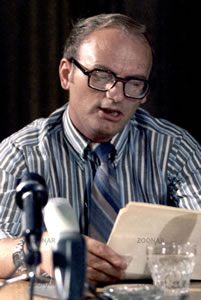
Hermann Kant (Hamburg, 14 juni 1926)
De Britse schrijver Peter Mayle werd geboren in Brighton op 14 juni 1939. Zie ook mijn blog van 14 juni 2009 en ook mijn blog van 14 juni 2010.
Uit: Encore Provence
There were many and hideous outbreaks of legalese in everyday speech, reflecting the rise of litigation as a national spectator sport. "Surplusage" was one of a hundred of these horrors. I noticed also that sophisticated and influential Americans--those whose comments are sought by the media--were not content to finish anything but preferred to "reach closure," and I have a nasty feeling that it won't be long before this affectation is picked up by waiters in pretentious restaurants. I can hear it already: "Have you reached closure on your salad?" (This, of course, would only be after you had spent some time bending your "learning curve" around the menu.)
We met, for the first time, the "outster," although we never saw a trace of his more fortunate relative, the inster. We were taught to give up our hopelessly old-fashioned habit of concentrating and instead try "focusing." Every day seemed to bring new and exciting vocabulary options. But these minor curiosities didn't alter the fact that we were surrounded by at least some version of the mother tongue and therefore should have felt quite at home.
Somehow we didn't, although it certainly wasn't for lack of a welcome. Almost everyone we met lived up to the American reputation for friendliness and generosity. We had settled in a house outside East Hampton, on the far end of Long Island, a part of the world that, for nine months a year, is quiet and extremely beautiful.
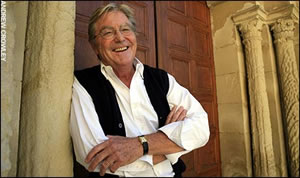
Peter Mayle (Brighton, 14 juni 1939)
De Amerikaans-Poolse schrijver Jerzy Kosiński werd geboren in Łódź op 14 juni 1933. Zie ook mijn blog van 14 juni 2007 en ook mijn blog van 14 juni 2008 en ook mijn blog van 14 juni 2009 en ook mijn blog van 14 juni 2010.
Uit: The painted bird
Sometimes days passed and Stupid Ludmila did not appear in the forest. Lekh would become possessed by a silent rage. He would stare solemnly at the birds in the cages, mumbling something to himself. Finally, after prolonged scrutiny, he would choose the strongest bird, tie it to his wrist and prepare stinking paints of different colors which he mixed together from the most varied components. When the colors satisfied him, Lekh would turn the bird over and paint its wings, head, and breast in rainbow hues until it became more dappled and vivid than a bouquet of wildflowers.
Then he would go into the thick of the forest. There Lekh took out the painted bird and ordered me to hold it in my hand and squeeze it lightly. The bird would begin to twitter and attract a flock of the same species which would fly nervously over our heads. Our prisoner, hearing them, strained toward them, warbling more loudly, its little heart, locked in its freshly painted breast, beating violently.
When a sufficient number of birds gathered above our heads, Lekh would give me a sign to release the prisoner. It would soar, happy and free, a spot of rainbow against the backdrop of clouds, and then plunge into the waiting grown flock. For an instant the birds were confounded. The painted bird circled from one end of the flock to the other, vainly trying to convince its kin that it was one of them. But, dazzled by its brilliant colors, they flew around it unconvinced. The painted bird would be forced farther and farther away as it zealously tried to enter the ranks of the flock. We saw soon afterwards how one bird after another would peel off in a fierce attack. Shortly the many-hued shape lost its place in the sky and dropped to the ground. These incidents happened often. When we finally found the painted birds they were usually dead. Lekh keenly examined the number of blows which the birds had received. Blood seeped through their colored wings, diluting the paint and soiling Lekh's hands.
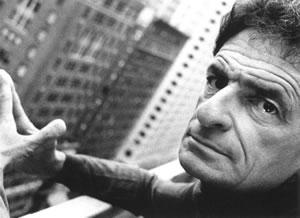
Jerzy Kosiński (14 juni 1933 3 mei 1991)
De Amerikaanse schrijfster en abolitioniste Harriet Beecher Stowe werd geboren in Litchfield, Connecticut, op 14 juni 1811. Zie ook mijn blog van 14 juni 2010 en eveneens alle tags voor Harriet Beecher Stowe op dit blog.
Uit: Uncle Tom's Cabin
His companion, Mr. Shelby, had the appearance of a gentleman; and the arrangements of the house, and the general air of the housekeeping, indicated easy, and even opulent circumstances. As we before stated, the two were in the midst of an earnest conversation.
"That is the way I should arrange the matter," said Mr. Shelby.
"I can't make trade that way - I positively can't, Mr. Shelby," said the other, holding up a glass of wine between his eye and the light.
"Why, the fact is, Haley, Tom is an uncommon fellow; he is certainly worth that sum anywhere, - steady, honest, capable, manages my whole farm like a clock."
"You mean honest, as niggers go," said Haley, helping himself to a glass of brandy.
"No; I mean, really, Tom is a good, steady, sensible, pious fellow. He got religion at a camp-meeting, four years ago; and I believe he really did get it. I've trusted him, since then, with everything I have, - money, house, horses, - and let him come and go round the country; and I always found him true and square in everything."
"Some folks don't believe there is pious niggers Shelby," said Haley, with a candid flourish of his hand, "but I do. I had a fellow, now, in this yer last lot I took to Orleans - 't was as good as a meetin, now, really, to hear that critter pray; and he was quite gentle and quiet like. He fetched me a good sum, too, for I bought him cheap of a man that was 'bliged to sell out; so I realized six hundred on him. Yes, I consider religion a valeyable thing in a nigger, when it's the genuine article, and no mistake."
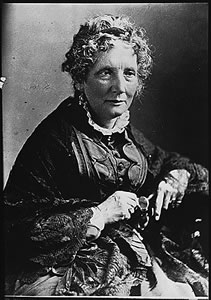
Harriet Beecher Stowe (14 juni 1811 1 juli 1896)
De Franse dichter René Char werd geboren op 14 juni 1907 in L'Isle-sur-la-Sorgue, Vaucluse. Zie ook mijn blog van 14 juni 2010 en eveneens alle tags voor René Char op dit blog.
Les Inventeurs
Ils sont venus, les forestiers de l'autre versant, les inconnus de nous, les rebelles à nos usages.
Ils sont venus nombreux.
Leur troupe est apparue à la ligne de partage des cèdres
Et du champ de la vieille moisson désormais irrigué et vert.
La longue marche les avait échauffés.
Leur casquette cassait sur les yeux et leur pied fourbu se posait dans le vague.
Ils nous ont aperçus et se sont arrêtés.
Visiblement ils ne présumaient pas nous trouver là,
Sur des terres faciles et des sillons bien clos,
Tout à fait insouciants d'une audience.
Nous avons levé le front et les avons encouragés.
Le plus disert s'est approché, puis un second tout aussi déraciné et lent.
Nous sommes venus, dirent-ils, vous prévenir de l'arrivée prochaine de l'ouragan,
de votre implacable adversaire.
Pas plus que vous, nous ne le connaissons
Autrement que par des relations et des confidences d'ancêtres.
Mais pourquoi sommes-nous heureux incompréhensiblement devant vous et soudain pareils à des enfants?
Nous avons dit merci et les avons congédiés.
Mais auparavant ils ont bu, et leurs mains tremblaient, et leurs yeux riaient sur les bords.
Hommes d'arbres et de cognée, capables de tenir tête à quelque terreur
mais inaptes à conduire l'eau, à aligner des bâtisses, à les enduire de couleurs plaisantes,
Ils ignoraient le jardin d'hiver et l'économie de la joie.
Certes, nous aurions pu les convaincre et les conquérir,
Car l'angoisse de l'ouragan est émouvante.
Oui, l'ouragan allait bientôt venir;
Mais cela valait-il la peine que l'on en parlât et qu'on dérangeât l'avenir?
Là où nous sommes, il n'y a pas de crainte urgente.
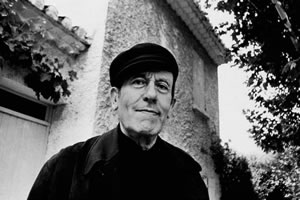
René Char (14 juni 1907 19 februari 1988)
14-06-2011 om 20:39
geschreven door Romenu 
Tags:Hermann Kant, Peter Mayle, Jerzy Kosinski, Harriet Beecher Stowe, René Char, Romenu
|

